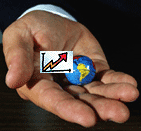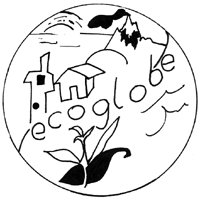Public Conference
Peak-Oil? = Peak-Growth?
Wednesday, 19 May 2010, 20:15
at UniMail, Auditorium MR380
40 bd du Pont-d'Arve, Geneva [map & contacts ] ]
Public conference on maximum daily oil production and the consequences for economic growth, agriculture, and our lifestyles.
Opening and introduction:
20:20h Mr/Ms ... [to be confirmed],
Students Association of the Institute of Environment Sciences
of Geneva University
Speakers:
 20:25 Dr. Michael Dittmar,
20:25 Dr. Michael Dittmar,
Physicist EPFZ Zurich (CERN):
Energy outlook and alternatives.
When will we have to live with less oil?
Which alternatives have a realistic future?
 20:40 Dr. Elangi Botoy Ituku,
20:40 Dr. Elangi Botoy Ituku,
International law, UMEF-University, Genève:
Our lifestyles and petroleum - here and there.
Globalisation is offering the same daily stuff to Geneva as to the Congo, thanks to oil.
Can we live with less, when the black flows start diminishing?
 20:55 Dipl. Ing. Agr. Valentina Hemmeler Maïga,
20:55 Dipl. Ing. Agr. Valentina Hemmeler Maïga,
Agricultural scientist, Uniterre
The energetic dependence of agriculture and food.
How important is oil, used as feedstock for fertiliser and as fuel for agriculture, food processing and distribution?
21:10 Short pause for reflection
21:15 Focused and balanced discussion
 Moderator: [to be confirmed]
Moderator: [to be confirmed]
Helmut Lubbers,
DiplEcol MSocSc Ing.
ecopsychologist,
Sustainable Development scientist
The conference theme in a few words
It seems that peak-oil has come to our doorsteps. Within a few years we'll have to reckon with shortages of oil and natural gas.
Petroleum is not only used for transportation, heating and electric power generation. It also serves as raw material for 1001 products in our daily lives, like plastics and medical drugs, or technical products for the construction and machinery industries, etc.
Our daily bread is also largely depending on oil: fertilisers and pesticides in agriculture, tractors for ploughing, tilling, and harvesting, the energy for transportation, transformation and distribution of food.
Can we put our trust in alternative energies? Or must we find different solutions?
The presentations will each take 15 minutes. Then the audience will have the opportunity to ask questions and voice opinions.
The moderator will ensure that questions do receive real answers and a focused and balanced discussion develops. Nobody will speak for more than two minutes at once.
The event is politically neutral. The environment and nature belong to all of us. They don't have political preferences.
If solutions that are proposed to counter oil scarcities have socio-economic effects, they will be the result of necessary action.
On our overpopulated and overexploited earth, it seems indisputable that we have to stop growth and start reducing our resource depletion.
With the support of:
Association des Etudiants de l'Institut des Sciences de l'Environnement de l'Université de Genève, Swiss Association for the Study of Peak-Oil ASPO, various environment organisations.
Sponsor:
Supercomm Langues & Communication SL&C - Language School
28 bd du Pont-d'Arve, 1205 Geneva - www.supercomm.ch
Contacts:
Organisation:
Helmut Lubbers, DiplEcol MSocSc BE, ecoglobe.ch
14 bd Carl-Vogt, 1205 Genève
Tél. 022 321 23 20, courriel h e l m u t @ ecoglobe . ch
Speakers:
Michael Dittmar: michael . dittmar @ cern . ch
Elangi Botoy: elangi botoy 22 @ hotmail . com
Valentina Hemmeler Maïga: i n f o @ uniterre . ch
Eliminate the spaces in the email addresses!
Last update: 11.5.2010 24h
|
 previous
ecostory
previous
ecostory  3/2010
3/2010
 next
next
 back |
home |
sustainability glossary |
sustainability |
growth scenarios
back |
home |
sustainability glossary |
sustainability |
growth scenarios
 back
English
back
English  Deutsch
Deutsch français
français [Peak-oil announcement home
[Peak-oil announcement home  ]
]
 ecoglobe
ecoglobe












 20:25 Dr. Michael Dittmar,
20:25 Dr. Michael Dittmar,  20:40 Dr. Elangi Botoy Ituku,
20:40 Dr. Elangi Botoy Ituku,  20:55 Dipl. Ing. Agr. Valentina Hemmeler Maïga,
20:55 Dipl. Ing. Agr. Valentina Hemmeler Maïga, Moderator: [to be confirmed]
Moderator: [to be confirmed]
